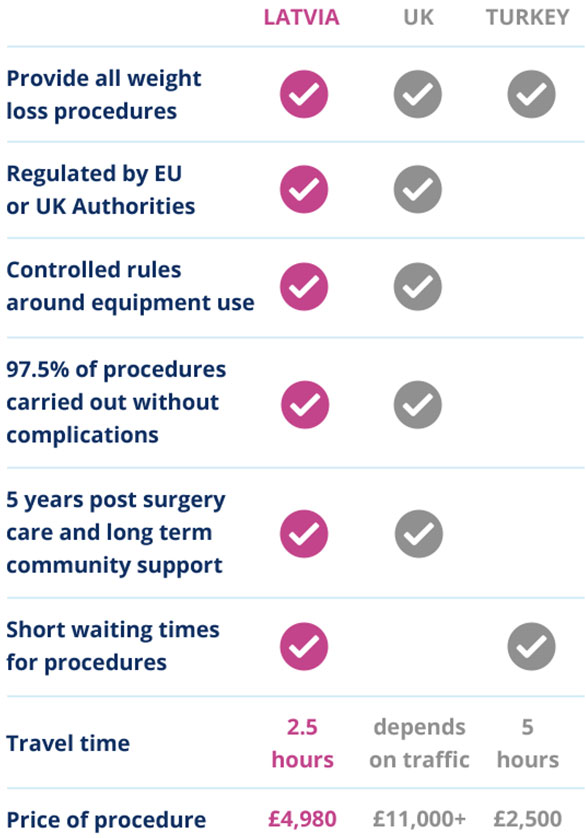1 in 2 gastric bands fail. Opt for a procedure that lasts
Join 2500+ success stories hitting their goal weight and achieving
long-term weight loss success with gastric band alternatives that last

As Featured On

As Featured On

why you should consider gastric band alternatives?
Unfortunately, reported to have higher failure and long term complication rates. Long term studies report a 40-66% failure rate (not losing enough weight), removal rate of 30%, and 25% rate of re-operation due to complications after 10 years.
Unfortunately, reported to have higher failure and long term complication rates. Long term studies report a 40-66% failure rate (not losing enough weight), removal rate of 30%, and 25% rate of re-operation due to complications after 10 years.

LONG-TERM WEIGHT LOSS
PROCEDURES
- Gastric Sleeve BMI 30+
The gastric sleeve is a minimally invasive procedure that produces consistent results with patients losing 50% of their excess weight within the firts year.
- Gastric Bypass Surgery BMI 35+
The gastric bypass is a popular weight loss surgery that’s proven to be an effective, consistent way of losing weight and keeping it off.
- Mini Gastric Bypass SurgeryBMI 35+
The mini gastric bypass is a faster, easier & less complex method of achieving the benefits of standard gastric bypass.

|
Connect with others considering weight loss surgery for lasting results |

Personal Nutritionist
Post surgery you'll work directly with one of our nutritionists who'll help you overcome dysfunctional eating habits and provide you with tailored dietary advice. So you can develop the skills needed for both weight loss and keeping weight off in the long term.

Psychotherapy support
Through community, re-education resources, and 1-2-1 sessions with both a therapist and a functional nutritionist we'll provide you the advice, guidance, knowledge and support needed to manage the psychological and nutritional challenges linked to obesity remission and bariatric surgery success.

Community support
The support doesn't just stop after surgery. Our medical team continue to check-in for 5 years post treatment so you're supported along the way. You'll also be added to a close-knit community of bariatric patients supporting one another in answering questions, sharing tips and recommendations and showcasing their journey.

Personal Nutritionist
Post surgery you'll work directly with one of our nutritionists who'll help you overcome dysfunctional eating habits and provide you with tailored dietary advice. So you can develop the skills needed for both weight loss and keeping weight off in the long term.

Psychotherapy support
Through community, re-education resources, and 1-2-1 sessions with both a therapist and a functional nutritionist we'll provide you the advice, guidance, knowledge and support needed to manage the psychological and nutritional challenges linked to obesity remission and bariatric surgery success.

Community support
The support doesn't just stop after surgery. Our medical team continue to check-in for 5 years post treatment so you're supported along the way. You'll also be added to a close-knit community of bariatric patients supporting one another in answering questions, sharing tips and recommendations and showcasing their journey.
WHAT OUR PATIENTS SAY
|
|
|
TREATMENT THAT
DOESN‘T BREAK THE BANK




MEET THE EXPERIENCED MEDICAL
TEAM AT WEIGHT LOSS RIGA
Experience
Bariatric Surgery
Every Year
TV & Private Bathroom

Dainis Seimuskins
Head of Anesthesiology

Galina Cui
Gastroenterologist

Guna Bilande
Nutritionist

Mim Dickens
Head of Patient Coordination team

Discover how 2500+ UK patients achieved lasting weight loss success and learn everything you need to know about weight loss surgery
 |
Get the guide within seconds
|

within seconds
FREQUENTLY ASKED QUESTIONS
-
What Is a Gastric Band?
A gastric band, or LAP-BAND, is a weight loss surgery device that restricts the stomach's size with a silicone band. Surgically implanted, it creates a smaller upper stomach pouch, limiting food intake. The band's tightness can be adjusted with saline injections via a port under the skin. This procedure aims to help patients feel full sooner, promoting weight loss, but it's becoming less common due to newer, more effective weight loss surgeries. -
Are There Any Gastric Band Side Effects That You Should Be Aware Of?
Gastric band surgery may have side effects, including nausea, vomiting, acid reflux, and difficulty swallowing. Band slippage, erosion, or leakage can occur, leading to extra surgeries. A lot of patients don't get the results they hoped for and often experience weight regain. These common side effects are driving patients towards more minimally invasive weight loss surgeries. -
Advantages of Having Weight Loss Surgery Abroad
Weight loss surgery abroad is often chosen due to long NHS waiting times and high UK private clinic costs. While India, the Emirates, and South America offer options, distant travel can be uncomfortable. Opting for weight loss surgery in Europe, particularly Latvia can be more convenient. Latvia boasts high-quality bariatric surgeries, short waiting lists, and affordability. Riga's international airport simplifies travel, making it a popular choice for patients from the UK and Europe seeking cost-effective, high-standard procedures with minimal travel hassle and cultural adjustments. -
How Does a Gastric Band Work?
A gastric band limits food intake, leading to initial weight loss, but its challenges shouldn't be underestimated. Maintaining weight loss demands lifelong commitment, including dietary restrictions and frequent band adjustments to avoid regaining weight. It's essential to consider these long-term commitments before opting for this procedure. -
Is Gastric Band Removal Possible?
Yes, gastric band removal is possible and relatively common. Many individuals seek our clinic for this procedure. This is usually due to complications with the band or inadequate weight loss- the band can be safely removed by a surgical team with experience in this area. -
Is Weight Loss Surgery in Latvia Safe?
Bariatric surgery in Latvia is gaining popularity due to specialized clinics offering competitive prices. Weight Loss Riga stands out with experienced surgeons and top-notch facilities, maintaining strict safety and professionalism standards similar to the UK. Patients considering gastric sleeve or other weight loss procedures can trust our safe and secure environment. Latvia offers safer, less invasive surgeries, like mini gastric bypass, using advanced techniques. Our clinic emphasizes low risks, with no reported deaths due to procedures or negligence. Patients receive personalized care from experienced surgeons and dedicated coordinators for a stress-free experience, even post-surgery. -
How Long Does a Gastric Band Last?
A gastric band is not a permanent solution for weight loss. Over time, it may require multiple adjustments, repairs, or even removal due to complications such as band slippage, erosion, or leakage. The need for ongoing maintenance and potential issues can make the long-term reliability of gastric bands a concern for some individuals seeking weight loss solutions. -
What Is a Gastric Band Slippage?
Gastric band slippage is a common complication where the silicone band placed around the stomach may move or slip out of its intended position. This can cause the upper stomach pouch to become larger, reducing the restriction on food intake and potentially leading to inadequate weight loss or other problems, necessitating surgical correction. -
How Much Is a Gastric Band?
While gastric bands in the UK may range in price from £5,000 to £8,000, we have chosen not to provide this procedure at Weight Loss Riga due to its limited effectiveness and associated risks. Instead, we focus on offering safer and more successful weight loss solutions. -
More about Weight Loss Riga
Our weight loss clinic in Latvia upholds rigorous private clinic standards. With a dedicated team of professionals and some of Europe's finest surgeons, we prioritize top-quality care. Riga's well-connected international airport simplifies travel from the UK and across Europe. You'll find comfortable, hotel-like accommodations, and we recommend bringing someone with you to ease the experience of having weight loss surgery abroad. Our English-speaking staff ensures personalized, attentive care, making you feel like a welcomed guest rather than a mere patient.
BMI CALCULATOR
| Gastriс Sleeve | BMI 30+ |
| Mini Gastric Bypass | BMI 35+ |
| Gastric Bypass | BMI 35+ |
























